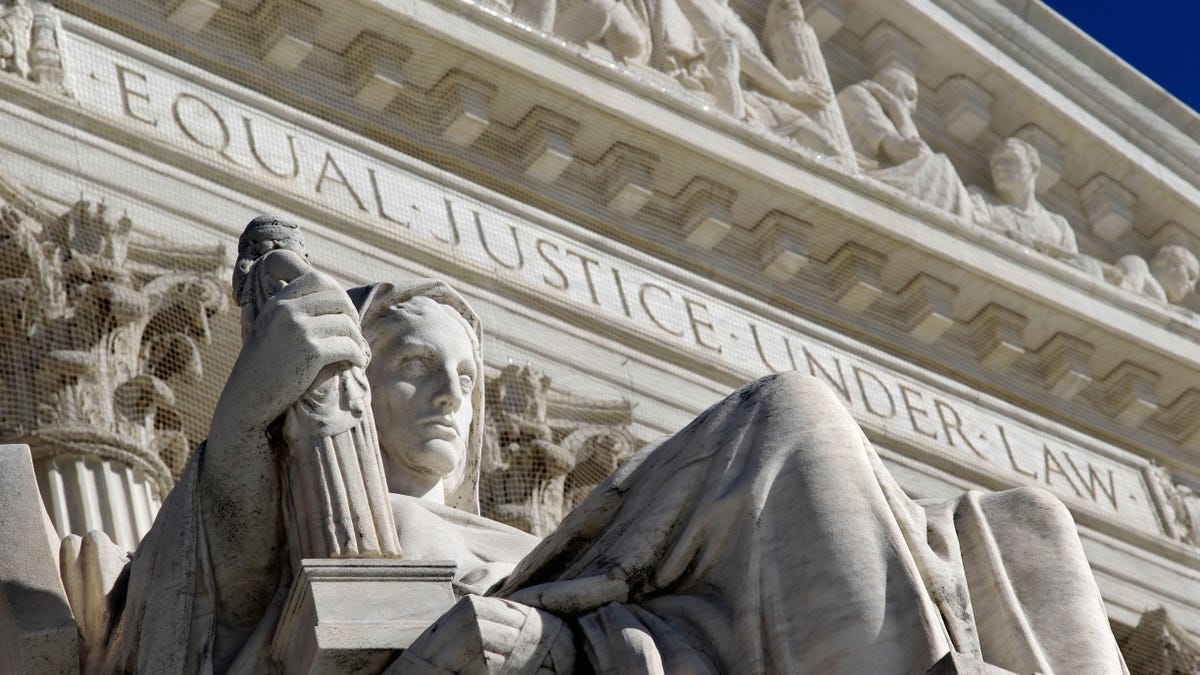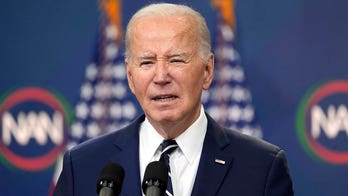
A detail of the West Facade of the U.S. Supreme Court is seen in Washington, Monday, March 7, 2011. (AP) (AP2011)
WASHINGTON – Arguing that President Obama's health care law was designed to fix an intractable national problem of exploding costs during a crisis, the administration submitted its opening brief to the Supreme Court Friday defending the law as both necessary and constitutional.
The 63-page brief is the first salvo in one of four cases accepted by the high court challenging the controversial health care law. Those cases will be heard in March. This filing is specifically focused on the suit challenging the law's so-called individual mandate, or requirement to buy health insurance.
Critics of the law, including the 11th Circuit U.S. Court of Appeals which struck it down, contend the Affordable Care Act goes too far in forcing Americans to obtain insurance or face a financial penalty.
The government continued to argue that the law is permissible under the Constitution's Commerce Clause allowing the feds to regulate economic activity in the states. "As Congress found, the minimum coverage provision is thus necessary to achieve Congress's concededly valid objective of reforming the interstate market in health insurance," wrote Solicitor General Don Verrilli.
Those reforms include forcing insurance providers to relax their coverage standards and ultimately make their coverage more affordable. Without the premiums coming in from all people now forced into the system, the law collapses. "The minimum coverage provision is key to the viability of the Act," Verrilli said, calling the law's focus on the insurance aspect of health care eminently reasonable.
A fundamental question before the court is whether this law, or any, can force Americans to buy something or face a penalty. Opponents say that's a step too far for the government to take. In this instance, they say the government can't force Americans who choose not to buy health insurance into paying for coverage.
In separate briefs, Florida and 25 other states urged the Supreme Court to throw out the entire health care law if the individual mandate is struck down. Dozens of GOP senators also filed a brief critical of the law.
The administration contends that health care is unique because all people, regardless of their insurance coverage, must eventually participate in the health care marketplace and that the collective costs from the uninsured drive up the costs for the rest -- $1,000 per family, according to the government. Verrilli said "this is classic economic regulation of economic conduct."
Another issue before the court in this case is how to punish people who don't obtain insurance. The law says people are to be penalized for non-participation. Opponents say there is no justification for such a penalty. They wonder how else could the government punish citizens, be it for not eating a certain vegetable or any number of non-actions.
It's a non-issue, according to government. "That Congress used the word 'penalty' in the minimum coverage provision, rather than 'tax,' is immaterial to whether it was a proper exercise of Congress's power over taxation," Verrilli explained.
In a background discussion with reporters before the brief was submitted, a senior administration official answered critics, saying it is "wildly unrealistic" that Congress would pass, for instance, a compulsory broccoli consumption law. The key, he argued, is that the health care law is specifically targeted to the economics of 17.6 percent of the U.S. economy, and is therefore covered under the Commerce Clause.
The response from the 26 states and others challenging the individual mandate is due next month.
Two other primary briefs are expected at the court Friday in the cases challenging whether the rest of the Affordable Care Act can survive if the individual mandate is struck down and whether federal tax law prohibits litigation until the ACA goes into effect.




